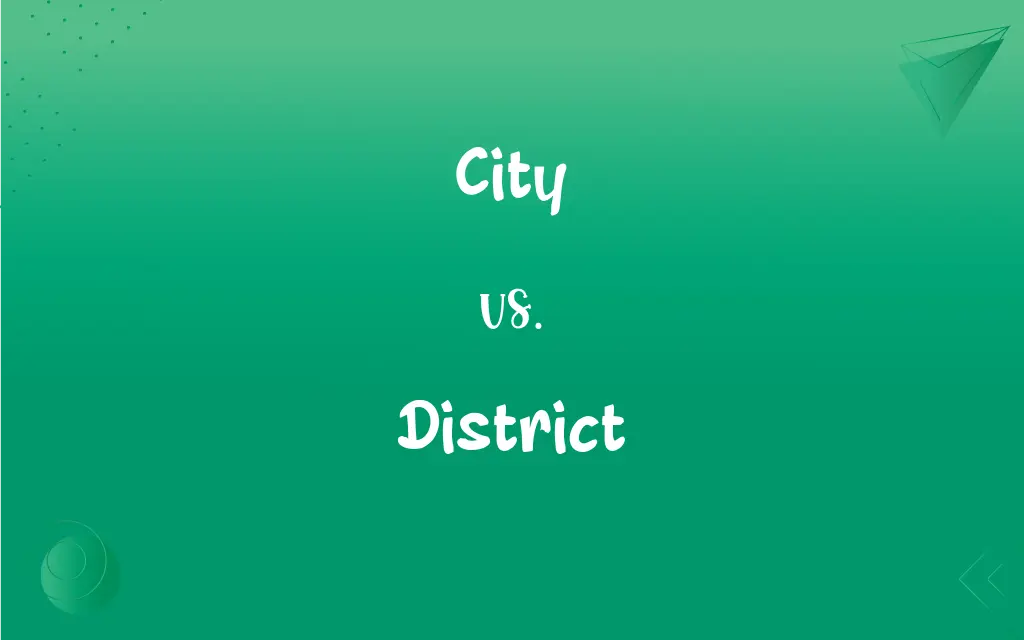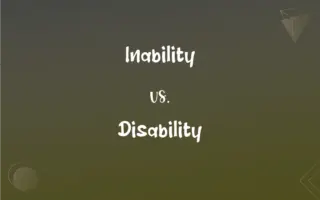City vs. District: What's the Difference?
Edited by Harlon Moss || By Janet White || Updated on October 4, 2023
A "City" is a large and permanent human settlement, while a "District" is a designated administrative or geographical region, which can encompass cities or parts of cities.

Key Differences
A "City" typically denotes a significant human settlement with its own local governance, whereas a "District" can be a broader territorial division, often with multiple settlements or geographical regions within it.
The boundaries of a "City" are generally determined by its urban development and population density. In contrast, a "District" might be defined for administrative, geographical, or political reasons, which may not always align with urban development.
"Cities" possess their own distinct cultural, economic, and social identities, influenced by their history, population, and geographical location. On the other hand, a "District" might encompass multiple cities or parts of cities, thus having a more varied and broader identity.
When talking about governance, a "City" will often have its own local governing body, such as a city council, to oversee its affairs. A "District", depending on the context, might have a separate administrative body or might be overseen by larger regional or state entities.
While "Cities" are primarily associated with urban areas, "Districts" can be urban, suburban, or rural, emphasizing the difference in their primary classification basis: one is based on urbanization and governance, the other on administrative or geographical divisions.
ADVERTISEMENT
Comparison Chart
Primary Definition
Large and permanent human settlement
Designated administrative or geographical region
Governance
Often has its own local governing body
Might be overseen by regional or state entities
Geographical Scope
Limited to urban boundaries
Can be urban, suburban, or rural
Examples
New York City, Los Angeles
School districts, congressional districts
Function
Center of commerce, culture, and living
Administrative, political, or geographical divisions
ADVERTISEMENT
City and District Definitions
City
A significant hub for economic, cultural, and social interactions.
The City attracts tourists from all over the world.
District
A region defined for administrative purposes.
He was elected from the 5th congressional District.
City
An area with dense infrastructure and amenities.
The City has a renowned art museum and theater.
District
A section of an area with distinct characteristics.
The fashion District is popular among shoppers.
City
A settlement with legal and recognized boundaries.
The City expanded its limits to include the new development.
District
An area overseen by specific authorities or entities.
The school District is implementing new educational policies.
City
An urban center distinct from towns or villages.
The City was bustling with activity during the festival.
District
A subdivision within a city or territory.
The historic District is a favorite among tourists.
City
A center of population, commerce, and culture; a town of significant size and importance.
District
A geographical or political division.
The agricultural District contributes significantly to the state's produce.
City
An incorporated municipality in the United States with definite boundaries and legal powers set forth in a charter granted by the state.
District
A division of an area, as for administrative purposes.
City
A Canadian municipality of high rank, usually determined by population but varying by province.
District
A region or locality marked by a distinguishing feature
Went to the lake district for their vacation.
City
A large incorporated town in Great Britain, usually the seat of a bishop, with its title conferred by the Crown.
District
To mark off or divide into districts.
City
The inhabitants of a city considered as a group.
District
An administrative division of an area.
The Soho district of London
City
An ancient Greek city-state.
District
An area or region marked by some distinguishing feature.
The Lake District in Cumbria
City
(Slang) Used in combination as an intensive
The playing field was mud city after the big rain.
District
(UK) An administrative division of a county without the status of a borough.
South Oxfordshire District Council
City
City The financial and commercial center of London. Used with the.
District
(transitive) To divide into administrative or other districts.
City
A large settlement, bigger than a town; sometimes with a specific legal definition, depending on the place.
São Paulo is the largest city in South America.
District
(obsolete) rigorous; stringent; harsh
City
(UK) A settlement granted special status by royal charter or letters patent; traditionally, a settlement with a cathedral regardless of size.
District
Rigorous; stringent; harsh.
Punishing with the rod of district severity.
City
(Australia) The central business district; downtown.
I'm going into the city today to do some shopping.
District
The territory within which the lord has the power of coercing and punishing.
City
(slang) A large amount of something used after the noun.
It’s video game city in here!
District
A division of territory; a defined portion of a state, town, or city, etc., made for administrative, electoral, or other purposes; as, a congressional district, judicial district, land district, school district, etc.
To exercise exclusive legislation . . . over such district not exceeding ten miles square.
City
A large town.
District
Any portion of territory of undefined extent; a region; a country; a tract.
These districts which between the tropics lie.
City
A corporate town; in the United States, a town or collective body of inhabitants, incorporated and governed by a mayor and aldermen or a city council consisting of a board of aldermen and a common council; in Great Britain, a town corporate, which is or has been the seat of a bishop, or the capital of his see.
A city is a town incorporated; which is, or has been, the see of a bishop; and though the bishopric has been dissolved, as at Westminster, it yet remaineth a city.
When Gorges constituted York a city, he of course meant it to be the seat of a bishop, for the word city has no other meaning in English law.
District
To divide into districts or limited portions of territory; as, legislatures district States for the choice of representatives.
City
The collective body of citizens, or inhabitants of a city.
District
A region marked off for administrative or other purposes
City
Of or pertaining to a city.
District
Regulate housing in; of certain areas of towns
City
A large and densely populated urban area; may include several independent administrative districts;
Ancient Troy was a great city
City
An incorporated administrative district established by state charter;
The city raised the tax rate
City
People living in a large densely populated municipality;
The city voted for Republicans in 1994
City
A large populated area with organized governance.
New York City is known for its skyscrapers.
FAQs
Does every "City" belong to a "District"?
Not always; the term "District" and its application vary by country and region.
Can a "District" have multiple "Cities"?
Yes, a "District" can encompass multiple "Cities."
Can a "District" have rural areas?
Yes, a "District" can include urban, suburban, and rural areas.
Is a capital "City" always the main part of a "District"?
Not necessarily; it depends on the administrative divisions of the region.
Is a "City" always larger than a "District"?
No, a "City" can be smaller, larger, or equivalent in size to a "District."
Can a "City" be within a "District"?
Yes, often a "District" can encompass an entire "City" or parts of several cities.
Is every "District" governed by its own council?
No, governance structures for "Districts" vary based on administrative regulations.
Can "District" boundaries change?
Yes, "District" boundaries can be redrawn for various reasons, including political or administrative ones.
Are "Cities" always urban?
Generally, yes. "Cities" are typically characterized by their urban nature.
Can a "City" form its own "District"?
In some administrative systems, a "City" might be equivalent to a "District."
Is the term "District" used universally?
While many countries use the term "District," its definition and function can vary globally.
About Author
Written by
Janet WhiteJanet White has been an esteemed writer and blogger for Difference Wiki. Holding a Master's degree in Science and Medical Journalism from the prestigious Boston University, she has consistently demonstrated her expertise and passion for her field. When she's not immersed in her work, Janet relishes her time exercising, delving into a good book, and cherishing moments with friends and family.
Edited by
Harlon MossHarlon is a seasoned quality moderator and accomplished content writer for Difference Wiki. An alumnus of the prestigious University of California, he earned his degree in Computer Science. Leveraging his academic background, Harlon brings a meticulous and informed perspective to his work, ensuring content accuracy and excellence.































































